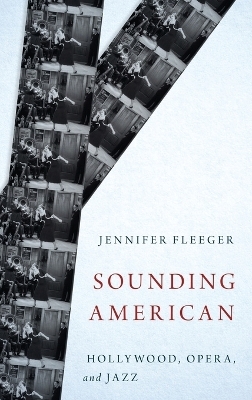
Sounding American
Hollywood, Opera, and Jazz
Seiten
2014
Oxford University Press Inc (Verlag)
978-0-19-936648-4 (ISBN)
Oxford University Press Inc (Verlag)
978-0-19-936648-4 (ISBN)
Sounding American: Hollywood, Opera, and Jazz looks at the role played by 1920s musical shorts in crafting studio identity and establishing American film sound. It argues that the persistence of opera and jazz on the soundtrack during and after the conversion produces a fragmentary text and encourages an active spectator.
Sounding American: Hollywood, Opera, and Jazz tells the story of the interaction between musical form, film technology, and ideas about race, ethnicity, and the nation during the American cinema's conversion to sound. Contrary to most accepted narratives about the conversion, which tend to explain the competition between the Hollywood studios' film sound technologies in qualitative and economic terms, this book argues that the battle between disc and film sound was waged primarily in an aesthetic realm. Opera and jazz in particular, though long neglected in studies of the film score, were extremely important in defining the scope of the American soundtrack, not only during the conversion, but also once sound had been standardized. Examining studio advertisements, screenplays, scores, and the films themselves, the book concentrates on the interactions between musical form and film technology, arguing that each of the major studios appropriated opera and jazz in a unique way in order to construct its own version of an ideal American voice.
The book's central question asks what the synthesis of opera and jazz during the conversion reveals about the stylistic and ideological norms of classical Hollywood cinema and the racial, ethnic, gendered, and socially stratified spaces of American musical production. Unlike much of the scholarship on film music, which gravitates toward feature film scores, Sounding American concentrates on the musical shorts of the late 1920s, showing how their representations of the stage, conservatory, ballroom, and nightclub reflected what opera and jazz meant for particular groups of Americans and demonstrating how the cinema helped to shape the racial, ethnic, and national identities attached to this music. Traditional histories of Hollywood film music have tended to concentrate on the unity of the score, a model that assumes a passive spectator. Sounding American claims that the classical Hollywood film is essentially an illustrated jazz-opera with a musical structure that encourages an active form of listening and viewing in order to make sense of what is ultimately a fragmentary text.
Sounding American: Hollywood, Opera, and Jazz tells the story of the interaction between musical form, film technology, and ideas about race, ethnicity, and the nation during the American cinema's conversion to sound. Contrary to most accepted narratives about the conversion, which tend to explain the competition between the Hollywood studios' film sound technologies in qualitative and economic terms, this book argues that the battle between disc and film sound was waged primarily in an aesthetic realm. Opera and jazz in particular, though long neglected in studies of the film score, were extremely important in defining the scope of the American soundtrack, not only during the conversion, but also once sound had been standardized. Examining studio advertisements, screenplays, scores, and the films themselves, the book concentrates on the interactions between musical form and film technology, arguing that each of the major studios appropriated opera and jazz in a unique way in order to construct its own version of an ideal American voice.
The book's central question asks what the synthesis of opera and jazz during the conversion reveals about the stylistic and ideological norms of classical Hollywood cinema and the racial, ethnic, gendered, and socially stratified spaces of American musical production. Unlike much of the scholarship on film music, which gravitates toward feature film scores, Sounding American concentrates on the musical shorts of the late 1920s, showing how their representations of the stage, conservatory, ballroom, and nightclub reflected what opera and jazz meant for particular groups of Americans and demonstrating how the cinema helped to shape the racial, ethnic, and national identities attached to this music. Traditional histories of Hollywood film music have tended to concentrate on the unity of the score, a model that assumes a passive spectator. Sounding American claims that the classical Hollywood film is essentially an illustrated jazz-opera with a musical structure that encourages an active form of listening and viewing in order to make sense of what is ultimately a fragmentary text.
Jennifer Fleeger is an Assistant Professor in the Department of Media and Communication Studies at Ursinus College. Her second book, Mismatched Women: The Voice Meets the Machine, will also appear in Oxford's Music/Media Series.
Introduction ; Chapter 1 Archiving America: Sound Technology and Musical Representation ; Chapter 2 Opera Cut Short: From the Castrato to the Film Fragment ; Chapter 3 Selling Jazz Short: Hollywood and the Fantasy of Musical Agency ; Chapter 4 Opera and Jazz in the Score: Toward a New Spectatorship ; Conclusion ; Bibliography ; Filmography ; Index
| Erscheint lt. Verlag | 1.7.2014 |
|---|---|
| Reihe/Serie | Oxford Music/Media Series |
| Zusatzinfo | 14 halftones |
| Verlagsort | New York |
| Sprache | englisch |
| Maße | 236 x 160 mm |
| Gewicht | 524 g |
| Themenwelt | Kunst / Musik / Theater ► Film / TV |
| Kunst / Musik / Theater ► Musik ► Jazz / Blues | |
| Kunst / Musik / Theater ► Musik ► Klassik / Oper / Musical | |
| Geisteswissenschaften ► Geschichte ► Regional- / Ländergeschichte | |
| Sozialwissenschaften ► Soziologie | |
| ISBN-10 | 0-19-936648-9 / 0199366489 |
| ISBN-13 | 978-0-19-936648-4 / 9780199366484 |
| Zustand | Neuware |
| Haben Sie eine Frage zum Produkt? |
Mehr entdecken
aus dem Bereich
aus dem Bereich
zur politischen Ästhetik des Jazz
Buch | Hardcover (2023)
Phillip Reclam (Verlag)
CHF 49,90
Die Geschichte des Jazz in Deutschland
Buch | Softcover (2021)
Reclam, Philipp (Verlag)
CHF 31,90


